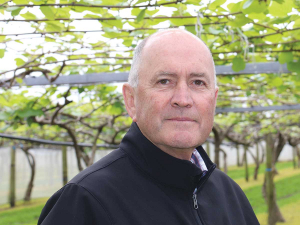"I want to give growers certainty and confidence that there is a future for the industry."
That's the goal in the coming season for Horticulture NZ chair Barry O'Neil, who says the past two years - especially the last one - have been extremely difficult and taken their toll on all those associated with the sector. O'Neil says it's been a nightmare with labour shortages, rising input costs and huge shipping disruptions.
He says there's also been a problem getting government policy issues presented in a way that those in the sector can see that they have got a future. O'Neil claims that in the present environment, policy is all about restricting and limiting rather than being enabling.
"I would certainlhy hope that over the course of the next 12 months we can progress those sort of discussions with the Government," he told Hort News. "After all, consumers overseas still want healthy natural products and the demand for our products is still fantastic."
O'Neil says the past season has been a mixed one right across the hort sector and even mixed within various crops. He says some sectors like his own kiwifruit have managed to survive and get their full crops picked, packed and exported.
However, he notes that other sectors have been less fortunate, such as the apple industry, which wasn't able to harvest all the fruit on the trees.
"We have had to mass- or strip-pick fruit in one go, whereas we'd normally be picking up to three or four times to pick fruit at the optimum period for quality and ripeness etc," he explains. "In a lot of cases, we have had to strip pick and then use the grading technology to differentiate on the quality of the fruit so the consumer is still getting high quality fruit."
However, O'Neil says the grower is not getting as much past at that top quality end and, as a result, getting returns for an average quality rather than 100% or 80% top quality. He says the export companies worked hard to ensure that only top quality fruit has been exported, but it's possible that there'll be less of this quality fruit sent overseas than is normally the case.
O'Neil says the kiwifruit crop is down by about 20 million trays on what was previously forecast. He says climate was one factor and notes that some growers deliberately laid down fewer canes to produce a lower crop because they were fearful there wouldn't be the labour to pick it.
He says other crops - such as avocados - have been hit hard by a range of problems and cherry growers struggled to get fruit in premium condition to their number one market of China because of the high cost and lack of airfreight space.


















